The Potomac River workshop was a success
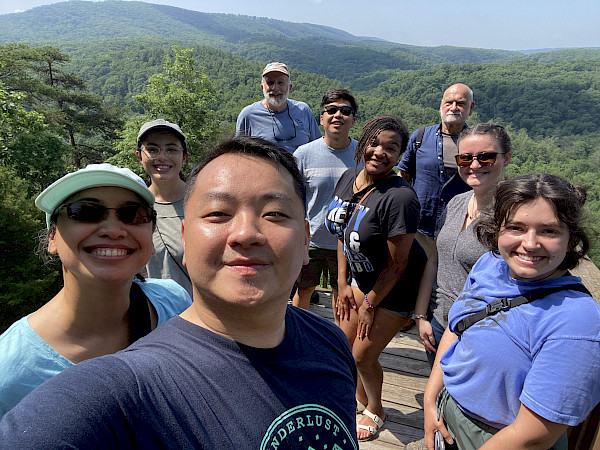
The COAST Card project made great progress in June with a small workshop held at Hood College in Frederick, MD. The project will focus on assessing the Potomac River Watershed through the lens of the COAST Card framework, which combines environmental report cards, social network analysis, and system dynamics modeling. The trip also consisted of meetings with scientists at the Appalachian Laboratory and field visits across different areas of the Potomac River Watershed. In hopes of engaging more stakeholders, there will be an open house workshop on July 21st from 12–8 pm at the Whitaker Community Commons building at Hood College. If you are interested in attending, you can register here.
The Potomac Open House was a success
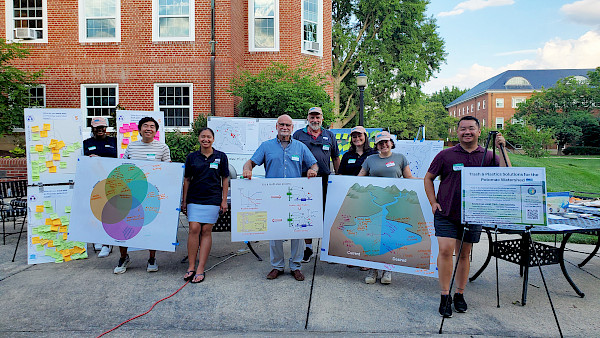
The COAST Card team held their first open house event for the Potomac River Watershed on July 21st at Hood College in Frederick, MD. Over 40 stakeholders dropped in throughout the day to engage with the key features of the COAST Card project. Stakeholders identified recreation as their top value of the watershed and populated maps of the Potomac Watershed and Frederick County with stickers indicating all the places they “play.” Participants also identified important indicators and potential future stakeholders they would like to work with. Additionally, stakeholders thought about cause and effect relationships within the watershed and built their vision of a sustainable Potomac.
Farewell, Global Sustainability Scholars!
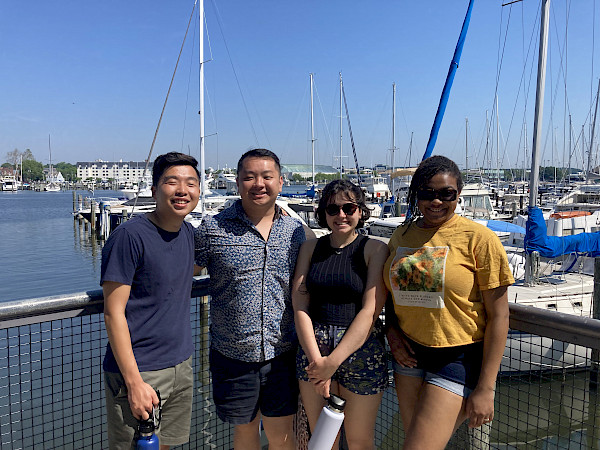
Our four Global Sustainability Scholars (GSS) completed their summer program at UMCES IAN at July end. During their time with us, they had the opportunity to travel throughout Maryland and helped with the COAST Card project in an impactful way. They played a large part in the Potomac Open House and completed their respective projects in specific sustainability topics. It has been such a pleasure to work with these bright individuals and we are grateful for all that they have done. We hope they go on to do amazing things.
Welcome, Nani!
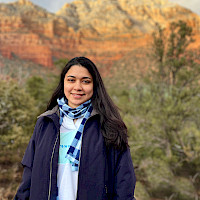
Veronica (Nani) is a new Graduate Research Assistant with IAN in Annapolis, Maryland where she will be working on visually representing indicators for the 2023 Chesapeake Bay Report Card. She got her B.A. in Marine Affairs, Geology, and Anthropology with a minor in Art from the University of Miami. A Plus One recipient, she was funded for a year to study Journalism and Film. From 2019-2022, Veronica worked as a NOAA contractor for both the Northeast and Southeast Fisheries Science Centers. During this time, her work focused on science communication. She pioneered projects such as video creation and outreach projects for underserved communities. Currently, she is a first year PhD student studying Environment and Society at the University of Maryland’s Center for Environmental Science.
Upcoming travel

This month, both the PacPath and COAST Card Projects will be traveling abroad!
For PacPath, Annie Carew and Heath Kelsey will be traveling to Suva, Fiji to hold a 3-day workshop at the University of the South Pacific. This workshop will include discussions about the effects of climate change on key environmental resources with important stakeholders. This will be the second PacPath workshop, with the first taking place in Noumea, New Caledonia in October 2022.
The US COAST Card team (Sidney Anderson, Veronica Lucchese, Vanessa Vargas-Nguyen, and Bill Dennison) will be traveling to Manila, Philippines to hold their first in-person meeting with other global members of the COAST Card project and with key stakeholders to focus on sustainability issues of Manila Bay.
Farewell, Sky!
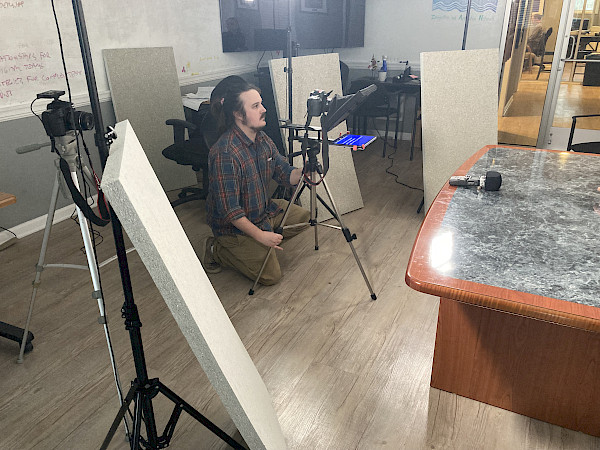
Last month, we said goodbye to our assistant science communicator, Sky Swanson. Sky has worked with IAN for the past 4 years on many projects, including the USGS Chesapeake Bay Science Strategy, the Chesapeake Bay SAV Watchers program, the NPS Assateague Island videos, and report cards for the Chesapeake Bay and Mississippi River Watershed. Sky was a great, very talented colleague to work with. We will miss him greatly and wish him the best in his future endeavors.
Welcome, Stacy!
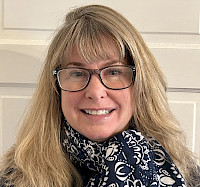
Stacy Schaefer is the new executive director of the Resilience Authority of Charles County, which has partnered with UMCES and Maryland Department of Natural Resources Chesapeake and Coastal Service. Stacy Schaefer holds a bachelor's degree in business, and a Juris Doctorate degree from the George Washington University National Law Center. After ten years of practicing law in Washington, D.C., Ms. Schaefer transitioned to a career as the Associate Director for Land Conservation with the Maryland Department of Natural Resources from 2009 to 2021. Most recently, Ms. Schaefer served as the Maryland Land Conservation Liaison for Resource Environmental Solutions (RES), an ecological restoration firm that works across the country. She is also a current Board member of the City of Annapolis and Anne Arundel County Resilience Authority and a lead team member of The Nature Conservancy’s Coastal Resiliency Framework project.
IAN Team Wins Green Space Data Challenge
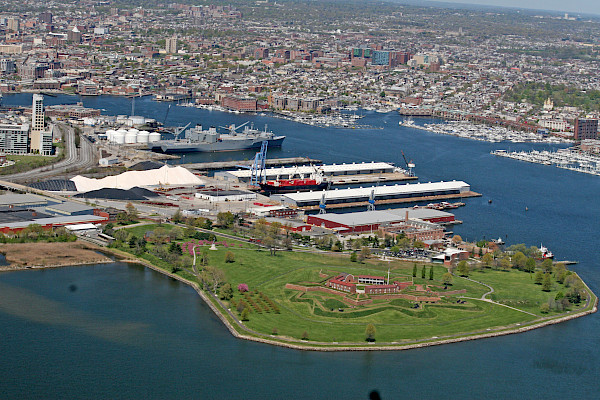
Georgetown University’s Massive Data Institute held a Green Space Data Challenge for the month of February. Veronica Malabanan Lucchese, Joe Edgerton, and Lili Badri entered into the Physical Environment category of the challenge and worked to develop a green space indicator for Baltimore, MD. Their submission won first place in the category, and they will be presenting their work at a webinar by the Association of Public Data Users (APDU) on Monday, April 17th in addition to being highlighted on Georgetown’s blog.
Welcome, Lili!
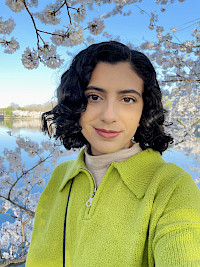
Lili Badri has recently transitioned into her new position as science communicator from her previous role as a science communication intern with IAN since May 2022. In her time with IAN, she has assisted with projects such as COAST Card, Translating USGS Science into Management Products, edX, and STAC Rising Water Temperatures. We are excited to have her on the team and look forward to her continued achievements at IAN!
Attending the National Monitoring Conference

The 13th National Monitoring Conference was held from April 24-28 in Virginia Beach, Virginia and attended by Alex Fries and Lili Badri. They had the opportunity to network, attend talks, and connect with long-time IAN partners in person. On the second day, Alex gave a talk detailing the role IAN plays in synthesizing monitoring data for management decisions. The conference was a great chance to learn about applications and advancements of water monitoring, data management practices, and the important role of community scientists. We look forward to incorporating some of what we learned into our future work.
Congratulations, Bill!
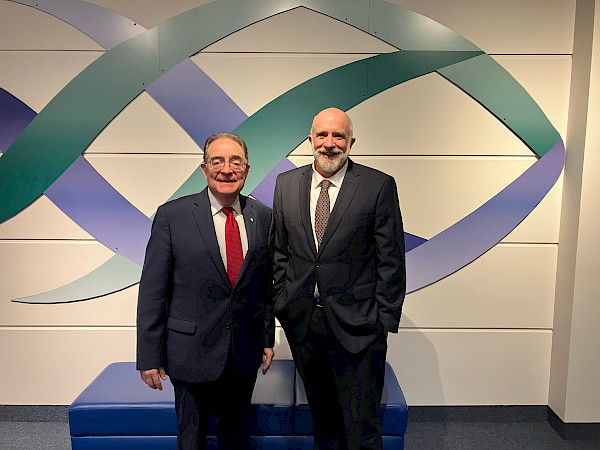
Congratulations to our very own Dr. Bill Dennison for being chosen as the Interim President of the University of Maryland Center for Environmental Science. Dr. Dennison, who has been an integral part of UMCES for many years, will commence his new position on September 25th. With decades of valuable experience at UMCES, his expertise will prove to be an asset during this transitional phase. Dr. Dennison is passionate about advocating for the vision of a UMCES Collaboratory and we are excited to see the great progress he will make in his new role.
Coming Soon: 2022 Chesapeake Bay Report Card
We are getting ready to release our yearly Chesapeake Bay and Watershed Report Card on Tuesday, June 6th at the Washington Sailing Marina in Alexandria, VA. Please join us in person or through Facebook Live. We are eager to share new indicators, update the community on the current condition of the Bay and watershed, and hold a listening session with stakeholders following the release. In addition, we will be holding three more stakeholder listening sessions in June: on June 8th at the Leonardtown Wharf Park, St. Mary’s County, MD, on June 14th at the Potomac Science Center in Woodbridge, VA, and on June 21st at the Canal Place Heritage Park, Cumberland, MD.
Welcome, Global Sustainability Scholars!
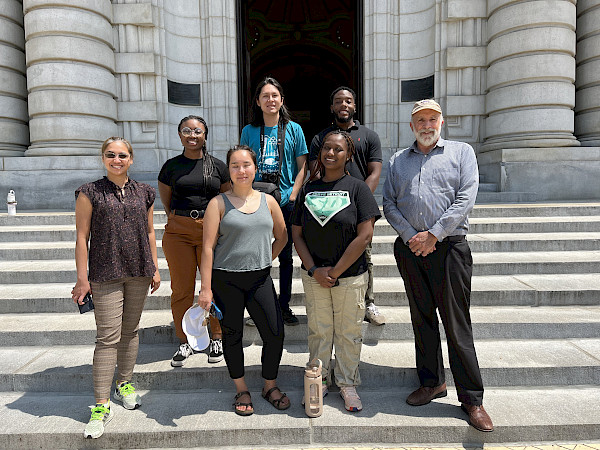
We are thrilled to welcome another remarkable group of Global Sustainability Scholars this summer from May 26-July 21. Please give a warm welcome to Anna Calderón (returning scholar, Wellesley College), Taylor Mitchell (University of Michigan), Kameryn Overton (Tuskegee University), Emma Gee (UC Santa Cruz), Darion Fredericks (Fort Lewis College), and Tre’Nard Morgan (University of Michigan). Comprised of diverse backgrounds and expertise, these scholars are passionate about environmental justice challenges, and with their understanding of sustainable practices, they bring a wealth of knowledge to our team. During their time, they will collaborate on the Coastal Ocean Assessment for Sustainability and Transformation Project (COAST Card) to develop a stakeholder engagement toolbox and the Potomac River Report Card utilizing listening sessions throughout the Potomac Watershed. The collective wisdom and enthusiasm of these scholars promises an exciting and impactful summer ahead.
2022 Chesapeake Bay and Watershed Report Card Released
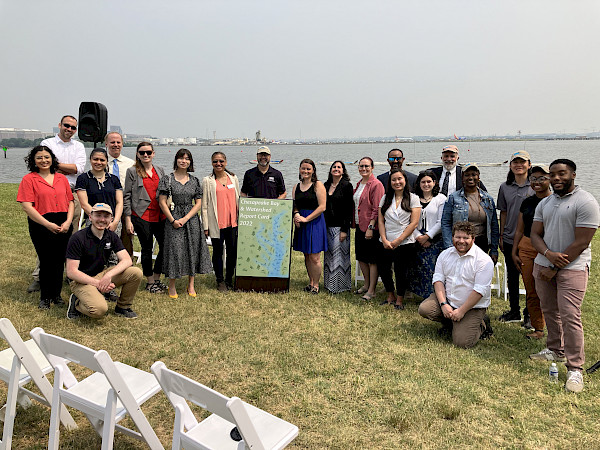
The highly anticipated release of our 2022 Chesapeake Bay and Watershed Report Card brought forth crucial insights into the health of this iconic ecosystem. The 16th annual release occurred on June 6th at the Washington Sailing Marina in Alexandria, Virginia. It was attended by representatives from Maryland, DC, and Virginia, along with environmental groups working within the Chesapeake Bay watershed. Our comprehensive assessment, based on rigorous scientific data and analysis, offers a holistic view of the Bay's ecological condition and the watershed’s ecological, economic, and societal conditions. In 2022, the Chesapeake Bay scored 51% (C) with a significantly improving trend, and the Chesapeake Bay watershed scored 52% (C). This was also the first year we evaluated the Environmental Justice Index; however, it was not included in the overall health score. To learn more about the scores, please visit ecoreportcard.org. This report card serves as a reminder of the ongoing work needed to restore and protect the Chesapeake Bay and surrounding watershed, encouraging collective action for a sustainable future.
Advancing the New Potomac Report Card through Listening Sessions
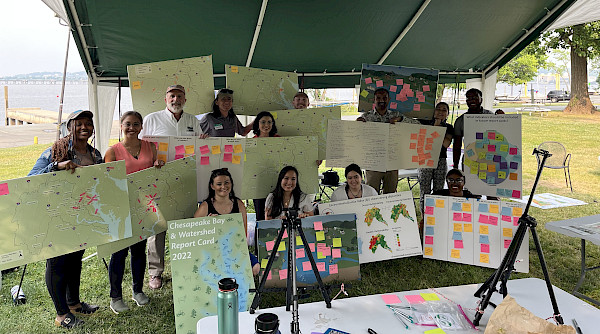
The 2022 Potomac River and Watershed Report Card was released on June 6th and incorporated data from the 2022 Chesapeake Bay and Watershed Report Card. The Potomac River and its watershed are a focus of the Coastal Ocean Assessment for Sustainability and Transformation Project (COAST Card), and the report card will be further developed through stakeholder input received at listening sessions throughout the Potomac watershed.
The COAST Card team has held two stakeholder listening sessions so far during June, with two more happening before the end of the month. The first session occurred on June 6th at the Washington Sailing Marina, right after the 2022 Chesapeake Bay Report Card release, and the second one occurred on June 8th at the Leonardtown Wharf Park. We had a great turnout of participants at both events and were able to showcase the new Potomac River Report Card. The next two will be on June 14th at the Potomac Science Center (Woodbridge, VA) and on June 22nd at Canal Place Heritage Park (Cumberland, MD).
These listening sessions are aimed at bringing together diverse community stakeholders in the Potomac Watershed. Engaging with individuals representing various backgrounds, perspectives, and interests allows for a comprehensive understanding of the challenges and aspirations of the watershed's communities. This collaborative approach fosters a sense of ownership, promotes environmental justice, and ensures that the voices of marginalized groups are heard and considered in the decision-making processes. The ultimate goal of these listening sessions is to help inform the next iteration of the Potomac River and Watershed Report Card.
2023 IAN Retreat at Horn Point Laboratory

On June 12, IAN held its annual retreat at Horn Point Laboratory, attended by IAN staff and the Chesapeake Bay Program (CBP) web and technical teams. The day started with a fun icebreaker, followed by IAN and CBP detailing their respective roles in an effort to increase collaboration across both teams. The first breakout session continued this topic by discussing collaboration between IAN, the CBP Technical Team, and the CBP Web Team in the context of the Chesapeake Bay Report Card. We discussed strategic planning, DEIJ (diversity, equity, inclusion, and justice), and IAN’s future in the Chesapeake Global Collaboratory. We also welcomed Essala Lowe (UMCES VP for Administration and Finance), Lois Colaprete (UMCES VP for Advancement), and Dave Nemazie (UMCES Chief of Staff and Executive Director of Government Affairs) for further comments on those topics. The day was then concluded with a brainstorming activity highlighting the various areas that IAN contributes to with its work. Thank you to all who could attend, and we look forward to implementing some of the suggestions we discussed.
Gaining Valuable Perspectives of the Potomac River and Watershed
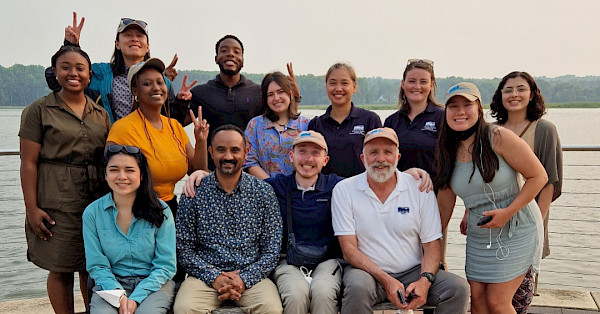
The Coastal Ocean Assessment for Sustainability and Transformation project (COAST Card) had a productive June month that entailed traveling to various areas of the Potomac Watershed and conducting four different listening sessions. The listening sessions were held in:
- Alexandria, VA at the Washington Sailing Marina
- Leonardtown, MD at the Leonardtown Wharf
- Woodbridge, VA at the Potomac Science Center
- Cumberland, MD at the Canal Place Heritage Park
Over 100 participants took the time to share their perspectives about the Potomac, including their values and threats to the Potomac and their vision for a sustainable Potomac. The responses will help inform the best indicators to use for assessing the ecosystem health in the area, with the goal of creating a more comprehensive Potomac River and Watershed report card.
Attending the Association for Public Data Users Conference
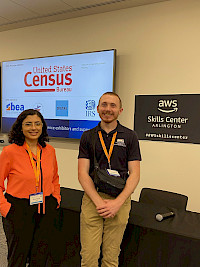
On July 25 and 26, Joe Edgerton and Lili Badri attended the Association for Public Data Users (APDU) Annual Conference in Arlington, Virginia at the Amazon Skills Center. They were invited to attend as winners of Georgetown’s Greenspace Data Challenge and had the opportunity to present their work. This year’s theme was Expanding the Universe of Public Data, and the first day was filled with informative talks related to different data-driven projects. The second day was kicked off with an open discussion from federal agency leaders at the U.S. Census Bureau and Bureau of Economic Analysis (BEA), followed by a panel of presentations from the Greenspace winners and Data Storytelling finalists. It was an excellent opportunity to learn about the variety of datasets available and the methods by which they can be used to solve pressing questions.
Another successful summer with the GSS Scholars
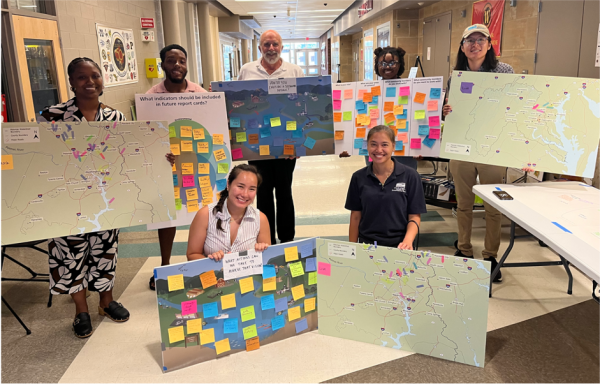
Our second cohort of Global Sustainability Scholars and Fellows (GSS) concluded their program on July 21st. They presented their findings from the Potomac Listening Sessions and gave valuable insights that will help us improve our outreach and engagement. We really appreciate their contributions and wish them the best of luck with their future endeavors.
Broadening Ecosystem Report Card Horizons

Last month, Bill Dennison and Vanessa Vargas-Nguyen held a webinar through the Chesapeake Research Consortium (CRC) where they discussed the expansion of the Chesapeake Bay and Watershed Report Card (CBRC) to include a greater suite of indicators of socio-environmental conditions. They discussed the addition of the environmental justice index in the latest report card, which had the furthest reach of any previous CBRC, with over 500 million total media impressions. They also talked about the COAST Card project and insights from recent listening sessions. The webinar can be watched here.
Welcome, Jon!
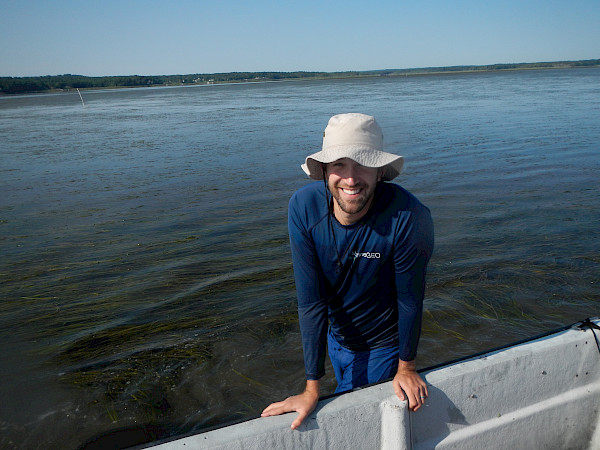
Please welcome Dr. Jon Lefcheck, IAN's new Research Scientist! Jon is a community ecologist, biodiversity scientist, and statistician with an enduring affinity for seagrasses. He has worked in systems as diverse as coral reefs, mangroves, salt marshes, oyster reefs, and deep-sea hydrothermal vents. He regularly engages scientists, managers, and volunteers around the world to understand, monitor, conserve, and restore coastal ecosystems for the benefit of nature and people. Jon has published over 75 peer-reviewed articles, including in top-ranking journals like Science and Nature, and his work has been covered by popular media, including the New York Times, Washington Post, Smithsonian Magazine and National Public Radio. He received his Ph.D. in Marine Science from the College of William & Mary in 2015 and was a post-doctoral researcher at the Virginia Institute of Marine Science until 2017 and at the Bigelow Laboratory for Ocean Sciences until 2018. Before his current posting, he served as the Coordinating Scientist for the MarineGEO program at the Smithsonian Institution until 2023. In his spare time, he enjoys running and playing with his cat, Berlioz (who you can find in the acknowledgments of many of his articles). You can learn more about him at his website or on Twitter.
Setting the stage for the UMCES Chesapeake Global Collaboratory
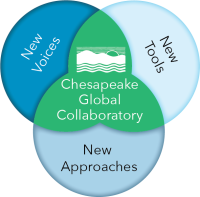
The UMCES Chesapeake Global Collaboratory (CGC) is a new initiative to generate accelerated solutions to big problems by engaging diverse voices, novel approaches, and innovative tools. IAN is helping UMCES to design and facilitate the meetings and events to continue to advance this initiative with faculty and external partners. On August 3rd, a lunchtime webinar was held for all of UMCES to learn about the progress of the CGC and to participate in its ongoing development. An overview of the CGC was given followed by a presentation of specific research projects from UMCES faculty that would fall within the Collaboratory structure. The next milestone for this project will be the Chesapeake Global Collaboratory Summit, which will take place on September 28–29 at the Rita Rossi Colwell Center in Baltimore, MD. It will feature plenary speakers Fred Tutman, ShaShi Shekhar, and Dr. Erica Key.
Summit builds momentum for the future Chesapeake Global Collaboratory

On September 28-29, the Chesapeake Global Collaboratory (CGC) Summit was held at the Rita Rossi Colwell Center in Baltimore, MD. The summit aimed to engage diverse voices, with speakers and representatives from the public, private, nonprofit, and education sectors in attendance. The event kicked off with a series of compelling plenary speeches that set the stage for the profound conversations to come.
Following the plenary were two consecutive panelist sessions with distinguished groups of experts who shared their thoughts on innovative tools through cyberinfrastructure and broadening participation in cyberinfrastructure. Afterward, participants had the opportunity to delve deeper into those specific topics during breakout sessions. These breakout groups fostered meaningful exchanges of ideas, enabling attendees to network, share experiences, and collaborate on potential solutions.
The second day began with some opening remarks and was followed by another panelist session and breakout group, this time with a focus on actionable science and applying the theories discussed from the previous day. We thank everyone who participated in this event and who helped make it possible.
Advancing plastics research in the Chesapeake Bay

From October 21-31, the first leg of the Chesapeake Bay Plastic Survey went underway. This project is led by the Ocean Research Project, an Annapolis-based nonprofit specializing in research expeditions aboard their sailboat, Marie Tharp, to improve understanding of marine ecosystems. The survey crew included seven sailors and academics, with IAN science communicator, Lili Badri, on board to help with sample collection and promotion of the project across social media platforms. This survey was the first comprehensive assessment of plastics in the Chesapeake Bay and will serve to provide a baseline condition of plastic pollution in the Bay. Additionally, the project aims to create a method for plastic sampling that can be adopted by monitoring agencies so that there is long-term data available for its analysis as a Bay health indicator.
Celebrating coastal science at the 27th Biennial CERF Conference
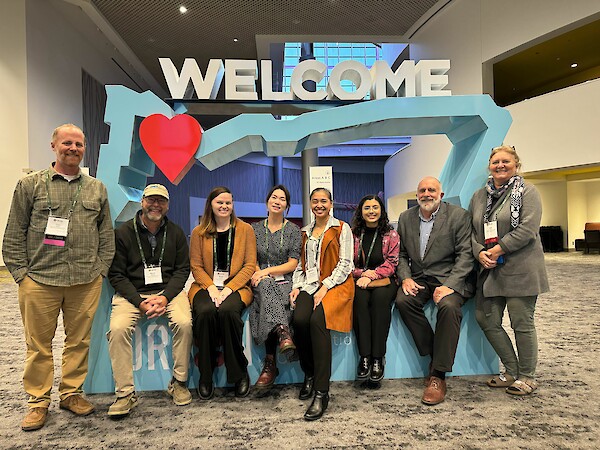
From November 12–16, several IAN staff attended the 2023 Coastal and Estuarine Research Federation (CERF) conference in Portland, Oregon. We presented on various IAN projects, providing holistic insights into applied coastal and estuarine research. Many enjoyed reconnecting with old friends and colleagues. UMCES always has a presence at this conference, and for many of the IAN staff, this was their first time experiencing CERF. Overall, the conference was a wonderful opportunity to learn about the latest coastal and estuarine research, including perspectives from indigenous peoples on traditional ecological knowledge (TEK).
2023: A year in review
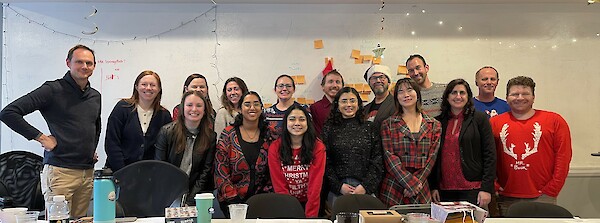
IAN is reflecting on a successful year in 2023. In the past year, we maintained many valuable collaborations with partners across the globe. We engaged stakeholders through listening sessions and workshops, supporting the creation of robust ecosystem health assessments. We attended numerous conferences and meetings, connecting with experts across multiple fields, and learning new methods to improve our engagement and assessment efforts. We appreciate everyone who has made this year a success, and we look forward to what 2024 has in store!
Notable Publications in 2023
- The first-ever New Caledonia Report Card
- The first-ever Rogue River Basin Report Card
- The annual Chesapeake Bay and Watershed Report Card
- The first-ever Potomac River and Watershed Report Card
- The first-ever Non-Tidal Patapsco River Report Card
- The annual IAN Report Card
- The first-ever White River Report Card
- The first-ever Fiji Report Card
- The annual Maryland Coastal Bays Report Card
Teaching Science Communication in 2023
- January: UMCES Graduate Students
- June: IMET Summer Interns
- August: Georgia Southern University faculty
- October: ZMT Students
COAST Card Project Highlights
The Coastal Ocean Assessment for Sustainability and Transformation (COAST Card) project had an eventful year consisting of both local and international travel.
- Conference and workshop in Manila, Philippines
- Conference and workshop in Tokyo, Japan; site visits to Ishigaki Island and Sekisei Lagoon, Japan
- Stakeholder listening sessions in the Potomac Watershed, USA:
- Alexandria, VA
- Leonardtown, MD
- Woodbridge, VA
- Cumberland, MD
- Silver Spring, MD
The international conferences and workshops allowed project partners to meet in person, make progress on goals, and gain a deeper understanding of the different study sites. The five stakeholder listening sessions held across the Potomac Watershed in the summer, facilitated by our second cohort of Global Sustainability Scholars, provided important insights on values, threats, and visions related to the watershed.
Charles County leads the way for local coastal adaptation
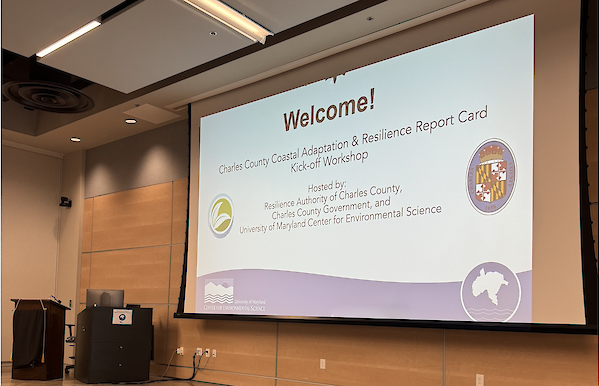
On December 13th, we held our first workshop at the Velocity Center in Indian Head, MD to kick off the Charles County Coastal Adaptation project. This project is a partnership between the Resilience Authority of Charles County, the Charles County Government, and the University of Maryland Center for Environmental Science and aims to produce a climate adaptation report card for Charles County, which will inform the county’s Climate Action Plan. More workshops will be planned in the coming months, and we look forward to better understanding Charles County’s preparedness for climate change.
Peer-Reviewed Publications
We published 10 peer-reviewed papers spanning a variety of environmental topics. Here are a few highlights:
- Effects of point and nonpoint source controls on total phosphorus load trends across the Chesapeake Bay watershed, USA (Environmental Research Letters, Qian Zhang)
- Rise of Ruppia in Chesapeake Bay: Climate change–driven turnover of foundation species creates new threats and management opportunities (Ecology Sustainability Science, William Dennison, Jonathan Lefcheck)
- Socio-ecological analysis of the eutrophication in Chesapeake Bay, USA (Frontiers in Marine Science, María Esther Leyva Ollivier, Heath Kelsey)
Advancing climate resilience and mitigation in the U.S. water sector

IAN’s ongoing work on adaptation and resilience was highlighted by the International Association for Hydro-Environment Engineering and Research (IAHR) in the third issue of their Hydrolink Magazine. The article, titled Net-Zero and Water: Highlighting U.S. Innovation and action in Mitigation, Adaptation and Resiliency, provides a comprehensive overview of the evolving efforts in the United States to address the intersection of net-zero goals and water management. It emphasizes the need for collaborative, multi-level strategies to mitigate GHG emissions, enhance resilience, and achieve climate goals in the water sector.
ConversatIANS with Ed Sheldon

In January, we started an informal seminar series called ConversatIANS and hosted our first guest speaker, Ed Sheldon, on January 11th. Ed is a citizen scientist and leader of the nonprofit Fenit Coast Conservation (FCC) in Ireland. Ed spoke about his efforts to collect seagrass data along Ireland’s coast and led an interactive discussion about mapping the seagrasses and how these efforts could be enhanced. Ed is also a colleague of Jon Lefcheck and Katie May Laumann and hosted them last year for presentations in Ireland.
Environmental justice stories through cinema

We collaborated with IMET and the Environmental Justice Journalism Initiative (EJJI) for a film screening and panel discussion as part of IMET’s Winter Series on January 24th. The screening featured two films: Eroding History by André Chung, focusing on two Black communities in Deal Island, MD, grappling with sea level rise and cultural preservation amid climate change, and Disruption: Baltimore’s Highway to Nowhere by Sean Yoes, detailing the impact of Highway 40 on Baltimore's Black community. The panel, moderated by Amanda Phillips de Lucas, director of the Baltimore Neighborhood Indicators Alliance, provided a great opportunity for the audience to engage with the filmmakers.
COAST Card goes to India
The COAST Card project is gearing up for its third international meeting, set to take place in Goa, India, from February 5th to 8th. This collaborative project brings together experts from the United States, the Philippines, India, Japan, and Norway. Following the successful hosting of project partners by the Philippines and Japan last year, this meeting promises to provide another invaluable opportunity for participants to connect with project collaborators, visit key study sites, and advance toward achieving the project's goals.
Chesapeake Bay Plastic Survey: Part 2

From March 16-25, the Ocean Research Project conducted the second part of their Chesapeake Bay Plastic Survey, following up on their October 2023 survey. In addition to measuring microplastic pollution levels across the Bay's mainstem and major tributaries, this research aims to develop a protocol for efficient, long-term monitoring of plastics across the Bay. There is a critical need to understand microplastic pollution's impact on water quality, and the implementation of a monitoring program can pave the way for the future development of a new indicator for the Chesapeake Bay and Watershed Report Card. Insights from both surveys are invaluable for understanding microplastic abundance, types, and distribution. The second survey also featured a virtual crew, including IAN science communicator Lili Badri, facilitating real-time data analysis and science communication.
Coming soon: Southeast Michigan Report Cards
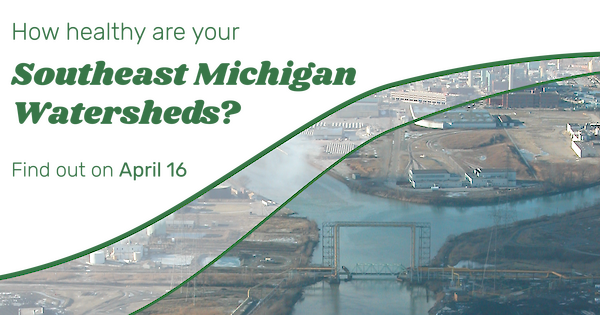
Mark your calendars for April 16th as we eagerly anticipate the debut of our Southeast Michigan Report Card series. This initiative encompasses six informative documents, each dedicated to assessing the socio-environmental health of key rivers in the region: the Clinton, Detroit, Huron, River Raisin, and Rouge Rivers, alongside a comprehensive summary of the Southeast Michigan region. The development of these report cards was a result of significant collaborative efforts with local stakeholders, and will provide important insights into river health while fostering community engagement and informed decision-making for the region. Please RSVP here to attend virtually or in person.
New Future Earth Coasts survey on coastal sustainability
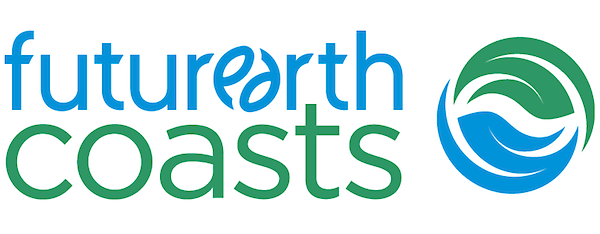
The Tour de Coasts survey by Future Earth Coasts has just launched and is looking for you to share your thoughts and help shape the future of coastal sustainability! This survey explores global priorities, challenges, and opportunities in coastal sustainability. Your input is pivotal for the Future Earth Coasts network. To take the survey, please click here.
This month in publications
Please see some of our recent peer-reviewed publications:
-
Contributing to sustainable development pathways in the South Pacific through transdisciplinary research: Conference report (Marine Policy, Annie Carew and Heath Kelsey)- This conference report synthesizes the discussions and lessons learned from a workshop with international and local experts and practitioners held in Nouméa, New Caledonia in October 2022. The workshop focused on addressing several climate change concerns in Fiji and New Caledonia, and the report highlights the need for diverse viewpoints in sustainable adaptation strategies.
-
Interplay of management and environmental drivers shifts size structure of reef fish communities (Global Change Biology, Jonathan Lefcheck)- This study investigates the impact of environmental factors and management strategies on fish biomass in the Mesoamerican Reef (MAR) region, with key findings related to shifts in fish community structure. These changes were linked to varying responses of juvenile and adult fish to both environment and management, highlighting the importance of considering such dynamics in the design of marine protected areas to promote fish biomass across different life stages.
-
Overcome imposter syndrome: Contribute to working groups and build strong networks (Biological Conservation, Jonathan Lefcheck)- This paper provides strategies for early career researchers to contribute effectively to scientific working groups, including generating ideas, offering insights, consolidating literature, analyzing data, and producing visuals. It also emphasizes the importance of fostering an inclusive and supportive environment, setting clear expectations, and communicating effectively to achieve innovative solutions in conservation and sustainability.
Collaborating to create the Luangwa River Report Card
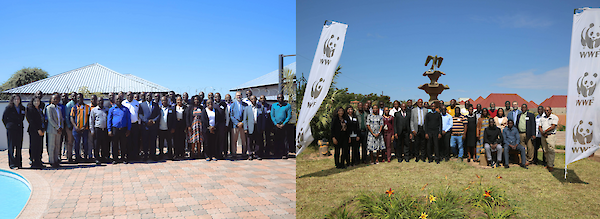
From April 28- May 17, Heath Kelsey, Alexandra Fries, and Lili Badri traveled to Zambia to work with WWF Zambia on the development of the Luangwa River Basin Report Card. In the first week, we hosted a report card training workshop in Lusaka, which allowed WWF and specific partners to learn about tools and techniques for stakeholder engagement, data analysis, and science communication. The following two weeks consisted of stakeholder workshops in Katete and Mpika where professionals across different sectors had the opportunity to create a shared vision for the Luangwa River Basin and identify and prioritize indicators to evaluate. This project will be our third collaboration with WWF Zambia, with previous projects including the Lower Kafue River Basin Report Card in 2019 and the Cuando River Basin Report Card in 2021. Stay tuned for a detailed workshop summary newsletter this summer.
Welcome 2024 Global Sustainability Scholars!
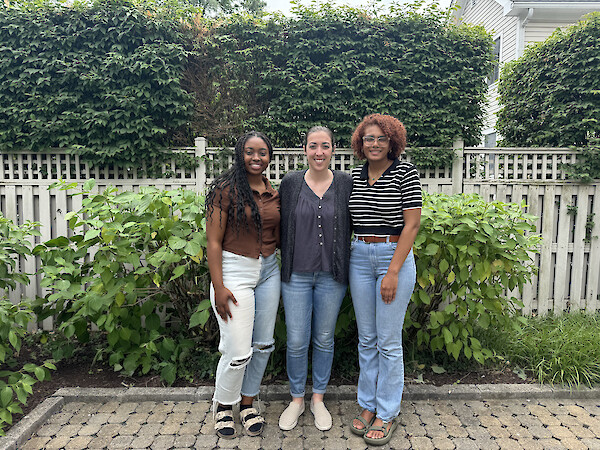
We welcomed the 2024 cohort of Global Sustainability Scholars on May 25th. This year we have returning scholar Kameryn Overton, along with Taylor Ouellette and Bailee Porter. Taylor is a Master of Ecology student at UNC Chapel Hill interested in addressing challenges at the intersection of environmental and social sustainability. Kameryn is a recent graduate of Tuskegee University, where she studied Environmental Science. Bailee is a master’s student at Jacksonville University studying public policy and marine science. This summer, they will work with IAN to coordinate an educational stakeholder engagement event with a community science component, communicate those efforts through a story map, and evaluate current policy to inform governance-related indicators for Report Cards.
Engaging with the agricultural community in Fredericksburg
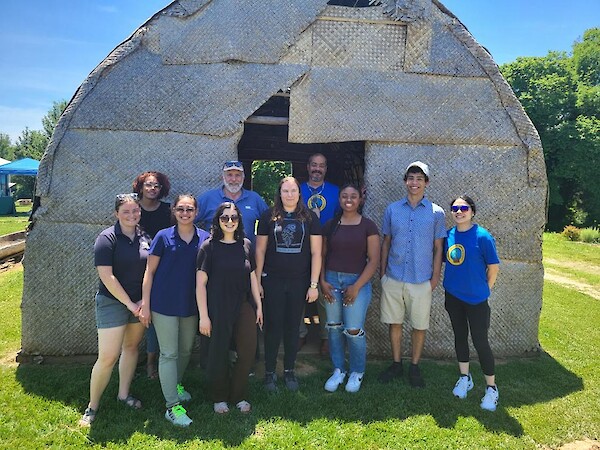
On June 1st, the COAST Card team and Global Sustainability Scholars attended the 2024 Community Ag Outreach event in Fredericksburg, VA. The event was hosted by the Tri-County/City Soil and Water Conservation District and Patawomeck Indian Tribe. Our table was interactive, following a listening session format which allowed attendees to identify watershed values, threats, visions, and actions, and to share their experiences with agriculture. This was an opportunity to engage with farmers, landowners, and local public and private organizations involved in conservation. The site also featured the Patawomeck Museum and Cultural Center, an outdoor Living History Village, and gardens.
Highlights from the 2024 Chesapeake Community Research Symposium

From June 10-12th, the 2024 Chesapeake Community Research Symposium was held in Annapolis, MD, and attended by Sidney Anderson, Veronica Malabanan-Lucchese, Lili Badri, and our summer Global Sustainability Scholars. The conference featured Chesapeake scientists, managers, and stakeholders who provided updates on Chesapeake Bay restoration and resilience progress through plenary talks, panel discussions, and special sessions. Our team presented on the final day during the session "Co-designing Solutions to Support Community Resilience in the Chesapeake Bay Watershed." The talks highlighted various aspects of the COAST Card project, including results from our previous listening sessions and social network analysis.
Coming soon: 2024 Chesapeake Bay & Watershed Report Card
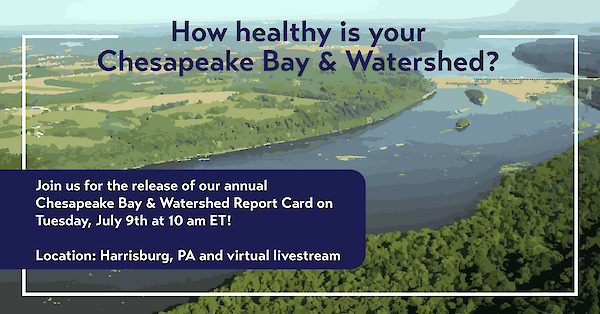
Our annual Chesapeake Bay & Watershed Report Card will be released on Tuesday, July 9th from 10am-12pm ET at the Susquehanna River Basin Commission in Harrisburg, PA. This will be our first-ever release event of this report card in Pennsylvania! The event will also be live-streamed on our Youtube page via a Zoom webinar. To attend, please RSVP here.
IAN Seminar Series: Level up your Scicomm
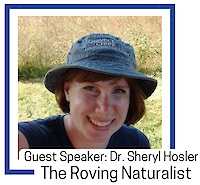
Please join us on July 10th at 12 pm ET to hear from our guest speaker, Dr. Sheryl Hosler, who will share her personal scicomm journey and a few tips and tricks to survive as a scientist on social media. Also known as “The Roving Naturalist,” Sheryl is currently a postdoctoral scholar at Penn State investigating ecosystem service provisioning by cover crop mixtures in conventional row-crop agriculture systems. She also has over 10 years of experience in conducting science communication for non-expert audiences, including 8+ years of experience creating multimedia scicomm content and broad collaborative experience. Please RSVP here to attend via Zoom.
Highlighting Chesapeake Bay science through our annual report card
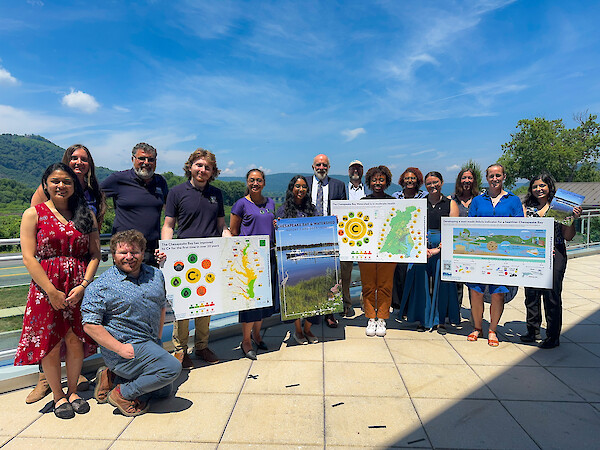
On July 9th, the 2023/2024 Chesapeake Bay and Watershed Report Card debuted in Harrisburg, PA at the Susquehanna River Basin Commission, marking the first-ever release in Pennsylvania. The press conference featured Pennsylvania Governor Josh Shapiro, three Maryland department secretaries (Josh Kurtz, Serena McIlwain, and Kevin Atticks), three Pennsylvania department secretaries (Cindy Dunn, Jessica Shirley, and Russ Redding), and U.S. EPA Region 3 Administrator Adam Ortiz. The event highlighted progress in improving the Chesapeake Bay score and the collaboration needed to sustain these efforts. The report card included stories on the Eastern Shore's agricultural land use and plans for a man-made debris indicator. A supplemental newsletter on man-made debris and current UMCES research was also released.
Exploring online opportunities in scicomm with Dr. Sheryl Hosler
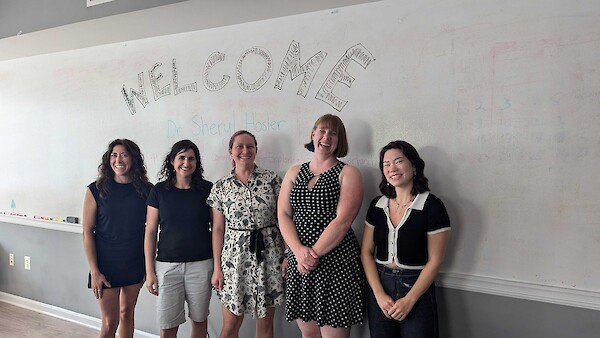
We were delighted to host Dr. Sheryl Hosler for our ConversatIAN seminar series on July 10th. She discussed her journey in science communication across various platforms, culminating in her online streaming project, Nature Check, which integrates science communication and role-playing games (RPG). We also explored this storytelling approach by playing a table-top RPG. It was refreshing and fun to learn about these unique approaches to science communication from Dr. Hosler.
Engaging communities in the Middle Branch
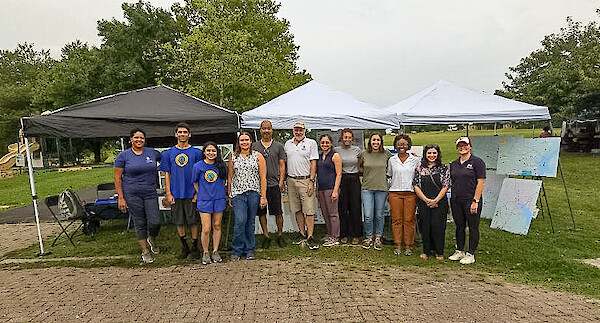
On July 20th, we held a stakeholder listening session at Middle Branch Park in Baltimore, MD. This event was in collaboration with the Environmental Justice Journalism Initiative (EJJI) and their Reel Rewards Program, which rewards anglers $30 for each head or body of an invasive fish species caught in the Middle Branch. It was a great opportunity to speak with anglers and for members of the public who enjoy the park to share their opinions on the current conditions of the Baltimore Harbor and Patapsco River.
Welcome, Bailey Robertory!
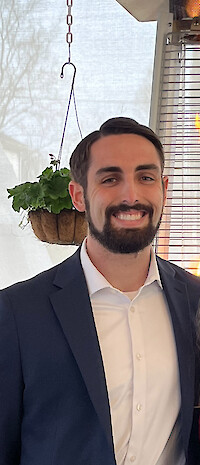
Born and raised in Fairfax, VA, Bailey grew up swimming and boating in the Chesapeake Bay Watershed. He obtained a B.S in Marine Science from the University of South Carolina. After graduating from USC, Bailey moved to Lubbock, Texas where he conducted a master’s thesis study on the effects of aquatic invasive species on native fish populations in New Mexico. He graduated from Texas Tech with a M.S in Wildlife, Aquatic, and Wildlands Science and Management. After graduating, he moved back east and spent the last year with the Chesapeake Research Consortium staffing the Chesapeake Bay Program’s Sustainable Fisheries Goal Implementation Team. In his free time, Bailey enjoys swimming, hiking, playing ice hockey, and spending as much time outside as possible. He is excited to join UMCES IAN as a Waterways and Bays Restoration Coordinator based out of the MD DNR office.
Recent IAN publications
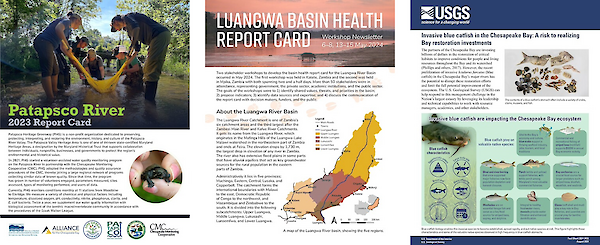
Check out some of the following publications we had last month:
- Patapsco River 2023 Report Card: This report card, produced with Patapsco Heritage Greenway as part of the Chesapeake Monitoring Cooperative, assesses the condition of the Patapsco River using volunteer monitoring data for the second year in a row.
- Luangwa River Workshop Newsletter: This newsletter summarizes the results of two stakeholder workshops held in May 2024 for the development of the Luangwa River Basin Report Card with WWF Zambia.
- Invasive blue catfish in the Chesapeake Bay: A risk to realizing Bay restoration investments: In collaboration with the U.S. Geological Survey (USGS), this fact sheet highlights the characteristics of invasive blue catfish, emphasizes the spread of blue catfish in the Chesapeake Bay over time, and informs about the capabilities of USGS to respond to this management challenge.
Farewell, Nathan!

Last month, we said farewell to IAN science communicator, Nathan Miller. Over the past five years, Nathan contributed to various projects, including the development of environmental health report cards such as the Rio Grande Report Card and the Coral Reef Ecosystem Status Reports. He also managed our extensive media library and led or co-facilitated numerous teaching initiatives for our science communication and data interpretation courses. We wish him all the best in his future endeavors!
Connecting with the community at the CBL Open House
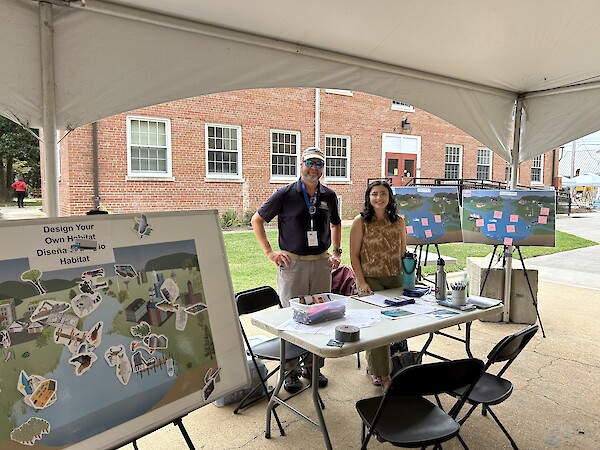
On September 7th, Heath Kelsey and Lili Badri represented IAN at the Chesapeake Biological Laboratory's annual open house. The IAN booth offered interactive activities for all ages and showcased information about our socio-environmental assessments. The event highlighted CBL’s innovative research while providing fun, hands-on activities for the local community. It was a fantastic opportunity to connect with community members and reconnect with fellow UMCES faculty and staff. Despite a slightly windy day, the event saw an impressive turnout.
Team building at the IAN office retreat
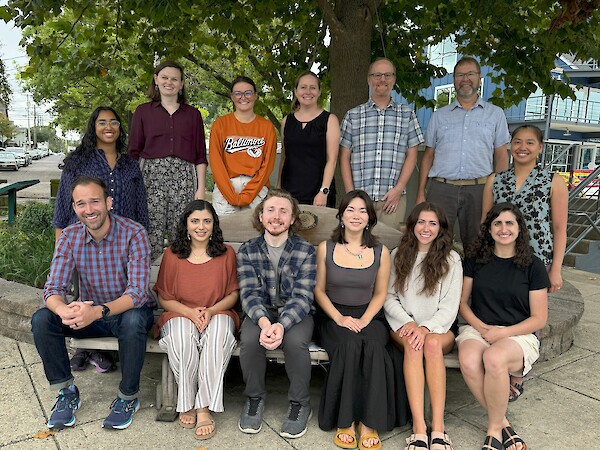
On September 23rd, IAN held a staff retreat at its Annapolis office, offering a day filled with engaging activities focused on team building for the science communicators and science integrators. The retreat featured friendly competitions, fun games, and exciting prizes, creating a relaxed and enjoyable environment for building stronger connections.
Stay tuned for upcoming events
We have a busy schedule this month with several events that we look forward to sharing with everyone soon.
- October 7-11: COAST Card USA Team will host international project partners
- October 9: Chesapeake Bay System Dynamics Modelling workshop
- October 10: Baltimore Harbor In Context Symposium
- October 12: HPL Open House
- October 16-17: Scoping meeting with park staff and stakeholders for Katahdin Natural Resource Condition Assessment
- October 18-20: Chesapeake Watershed Forum
Group Model Building for a Healthier Chesapeake Bay
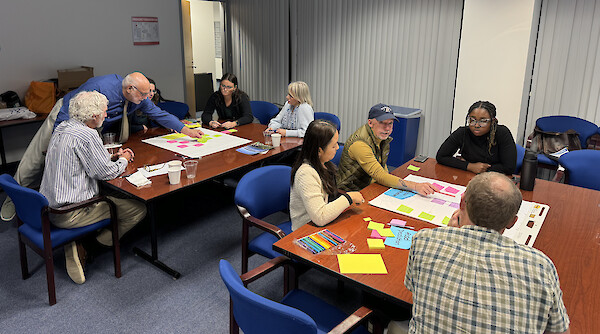
On October 9th, COAST Card’s partners from Norway, Dr. Pål Davidsen and Dr. Aklilu Tadesse, facilitated a system dynamics modeling (SDM) workshop with key stakeholders involved in Chesapeake Bay research and restoration. The workshop began with presentations about the COAST Card project, the Chesapeake Assessment Scenario Tool (CAST), and the process of SDM. This was then followed by an engagement activity where stakeholders identified important ecosystem services, and their responses were grouped into categories such as climate resilience and food production. These categories were assigned to groups of participants tasked with creating causal loop diagrams in a group model-building activity by specifying supporting ecosystem services and underlying threats. The workshop concluded with presentations about key findings from the project’s Potomac listening sessions and the social network analysis of the Potomac watershed. It was a very productive and informative meeting overall, and the results from the group modeling activity will be used to help progress the Chesapeake Bay and Watershed Report Card.
Advancing IAN's DEI Initiatives

On November 4th, IAN held a DEI training focused on Mitigating Microaggressions. The training was led by Dr. Leslie Krafft from UMD’s Office of Diversity & Inclusion, which offers a variety of diversity training options. The session provided a detailed overview of bias and microaggressions and how marginalized populations might disproportionately experience them. The presentation also provided steps to combat microaggressions and how awareness of one’s biases and actions can lead to a more fulfilling work culture. IAN staff also had a chance to reflect on and share their own identities and experiences, building trust and promoting strategies for workplace improvement.
Discussing Parachute Science at the Sea Grant Marine Debris Symposium
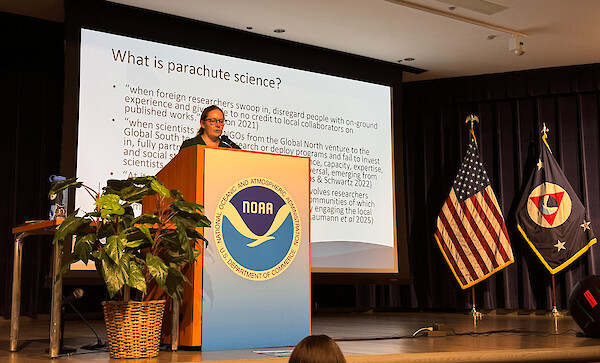
On November 14th, Katie May Laumann, Annie Carew, and Lili Badri attended the Sea Grant Marine Debris Symposium, held at the NOAA Auditorium and Science Center in Silver Spring, MD. There, they heard from leading scientists about projects aimed at reducing marine debris, encompassing the use of innovative technology and multidisciplinary collaborations. The day ended with the IAN team facilitating a workshop about Parachute Science, which featured an engaging presentation about the concept followed by a roleplaying activity. For the activity, attendees were asked to form groups, with one person from each group acting as a nonlocal scientist tasked to convince the others, representing various community members, to participate in their research project. The activity emphasized the need for local engagement and collaboration and led to a fruitful discussion afterward.
2024: A year in review
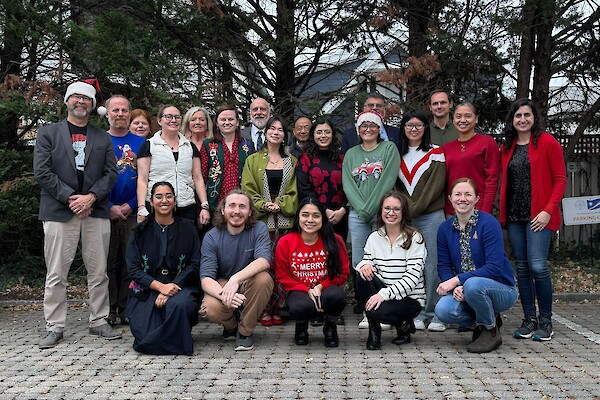
In 2024, IAN achieved remarkable success across several fronts. Our team participated in 38 events, both virtual and in-person, across four continents. We hosted our third cohort of Global Sustainability Scholars and celebrated Alexandra Fries' receipt of the 2024 President’s Award for Outstanding Research Support. Additionally, we launched the ConversatIANs seminar series, featuring guest speakers Ed Sheldon of Fenit Coast Conservation and Dr. Sheryl Hosler from Penn State. Over the year, we forged 34 valuable partnerships, leading to the co-creation of impactful science communication products and assessments. We are deeply grateful to all who contributed to this year's achievements and are excited for the opportunities that 2025 holds, including the centennial celebration of UMCES!
Notable Publications in 2024
- The first-ever Southeast Michigan Report Cards (available in English, Spanish, and Arabic)
- The annual Chesapeake Bay and Watershed Report Card
- The second Patapsco River Report Card
- The annual Maryland Coastal Bays Report Card
- The annual IAN Report Card
- The first-ever Tool Guide for Stakeholder Engagement in Coastal Communities
Peer-Reviewed Publications
We published 17 papers in 2024. Here are a few highlights:
- Assessment of the Chesapeake Bay Watershed socio-ecological system through the Circles of Coastal Sustainability framework (Frontiers in Water, María Esther Leyva Ollivier, Heath Kelsey)
- Tropicalization of mid-western Atlantic coastal bays by pinfish Lagodon rhomboides: a combined ecological and oceanographic perspective (Marine Ecology Progress Series, Jonathan Lefcheck, Katie May Laumann)
- Integrating monitoring and modeling information to develop an indicator of watershed progress toward nutrient reduction goals (Ecological Indicators, Qian Zhang, Isabella Bertani)
- Controls on Oxygen Variability and Depletion in the Patuxent River Estuary (Estuaries and Coasts, Veronica Malabanan-Lucchese, Qian Zhang)
- Effects of point and nonpoint source controls on total phosphorus load trends across the Chesapeake Bay watershed (Environmental Research Letters, Qian Zhang)
Teaching Science Communication in 2024
- January: REEF School Fellows, Lakeland Community and STEAM Center
- Spring semester: MEES Science Visualization Course
- June: IMET Summer Interns
- Fall semester: MEES Coastal Environment and Community Health
Projects completed supporting EPA Chesapeake Bay Program
Web Team highlights:
- UX Improvements and Accessibility Enhancements: Conducted UX testing and implemented improvements on the ChesapeakeBay.net homepage, navigation, and key templates, enhancing accessibility by remediating 112 of 149 issues.
- Content Updates and Strategic Revisions: Redesigned the search results page and updated multiple content areas, including infographics, ChesapeakeProgress indicators, and ChesapeakeDecisions, with new scientific and strategy data.
Data Analysis Team highlights:
- Chesapeake Bay TMDL Indicator Development: Led the development of the Chesapeake Bay TMDL indicator, integrating monitoring and modeling data to track nutrient reduction progress, which has been officially approved and published on Chesapeake Progress.
- Expansion to Nontidal Network Stations: Extended the TMDL indicator framework to quantify reduction progress at 83 stations for nitrogen, 66 stations for phosphorus, and 66 stations for sediment within the Nontidal Network. See R Shiny app METRIC.
- Water Quality Indicators: Led the annual integration of partner data to update two critical water-quality indicators: (1) Nutrient and sediment loads to the Chesapeake Bay, and (2) Water quality standards attainment indicator. On Chesapeake Progress and supported by enhanced R Shiny apps: Attainment Indicator and Attainment Deficit.
2025–2030 IAN Strategic Plan
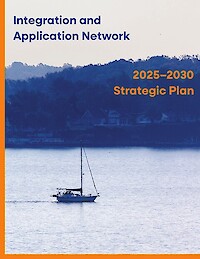
The latest IAN Strategic Plan details our objectives for the next five years and highlights our mission, vision, and values. In addition to spotlighting the important work that IAN has done so far, this document specifically provides metrics for achieving success in each objective and will allow us to gauge our progress effectively.
Join us for a Community Listening Session!
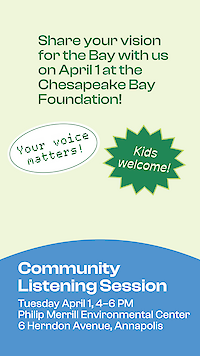
We want to hear from YOU! The Chesapeake Bay is more than just water; it’s the home, livelihood, and culture of many communities. We’re expanding the Chesapeake Bay Report Card to reflect community perspectives and concerns, socio-environmental justice, and local resilience. This is an opportunity to share your perspectives, connect with others, and help drive meaningful change.
Join us for a family-friendly event with great conversations and light refreshments on April 1st, 2025, anytime from 4-6 PM at the Chesapeake Bay Foundation headquarters in Annapolis. Your voice matters! Please register to attend here.
We are also seeking to connect with organizations working on Chesapeake Bay watershed issues from 12-3 PM on April 1st, so if you are interested in participating, please contact Vanessa Vargas-Nguyen at vvargas@umces.edu. We look forward to seeing you!
Highlighting USGS's Critical Bird Monitoring Programs
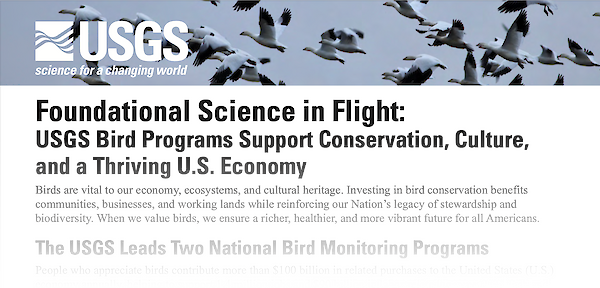
Our latest fact sheet, in partnership with the U.S. Geological Survey (USGS), was released last month, titled "Foundational Science in Flight: USGS Bird Programs Support Conservation, Culture, and a Thriving U.S. Economy." The fact sheet describes the history and critical impacts of the Bird Banding Laboratory (BBL) and the Breeding Bird Survey (BBS), two national bird monitoring programs led by the USGS. These programs have been key to informing science-based bird management and conservation while supporting the U.S. economy through birdwatching, hunting, and ecotourism. Explore the fact sheet here to discover over 100 years of progress achieved by these programs and their future objectives.
Upcoming: Charles County Climate Readiness Report Card
Stay tuned for the release of the Charles County Climate Readiness Report Card on April 26th! IAN’s collaboration with Charles County Government and the Resilience Authority comes after the release of the Maryland Coastal Adaptation Report Card in 2021 and represents a continuation of Maryland’s progress toward climate resilience and adaptation. This report card accounts for the unique features of Charles County to create an assessment which highlights the county’s vulnerability and their resilience to climate threats, serving as an important decision-making tool and a template for other regions.
Understanding Habitat Shifts in a Changing Climate
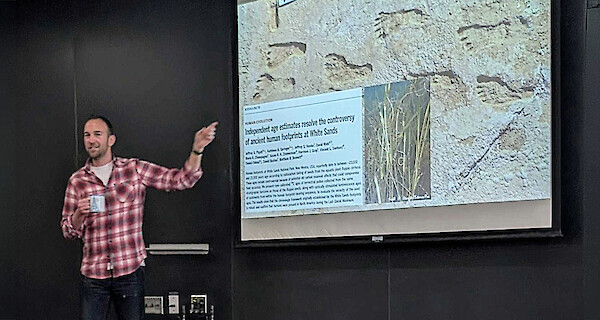
In March 28th, Jon Lefcheck gave a talk at MIT as part of the Ralph M. Parsons Laboratory Seminar Series. Jon spoke about a recent paper that he co-authored with Katie May Laumann, IAN’s Associate Director of Research, which focused on the expanding range of pinfish (Lagodon rhomboides) linked to increasing water temperatures. Increasingly, this fish has been discovered in Virginia’s restored seagrass meadows, a northward shift from its primary habitat.
Shaping the future of the Chesapeake Bay Report Card
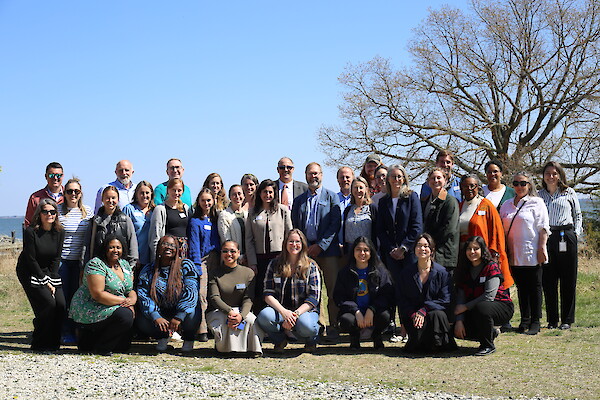
IAN partnered with the Chesapeake Bay Foundation (CBF) to host a workshop on April 1 at CBF’s Philip Merrill Environmental Center in Annapolis. The event brought together environmental professionals from across the region to inform the development of the annual Chesapeake Bay and Watershed Report Card (CBWRC). After a networking lunch, participants heard remarks from Dr. Bill Dennison, Professor of Marine Science and Vice President for Science Application at the University of Maryland Center for Environmental Science, and Hilary Falk, President and CEO of CBF. Attendees then broke into groups to discuss the role of watershed report cards, their alignment with ongoing work, and potential new indicators. The workshop concluded with a collaborative stakeholder mapping activity, offering valuable insights to guide future CBWRC efforts and improve communication around the region’s socio-environmental health. Moving forward, our goal is to continue engaging stakeholders to help create a CBWRC that accurately reflects the health of the environment and the communities that depend on it.
Farewell, Joe!
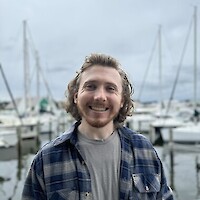
Last month, IAN bid a fond farewell to Assistant Science Communicator Joe Edgerton. During his time with us, Joe brought a thoughtful, analytical approach to every project, helping to translate complex scientific information into clear, accessible insights. His commitment to collaboration and effective communication made him a valued team member and a trusted voice in our engagement and educational efforts. He played a key role in several projects, including the Chesapeake Bay Report Card, IAN Report Card, Southeast Michigan Report Cards, and the National Park Service Resource Briefs. We are grateful for Joe’s dedication and impact, and we wish him the very best in his future endeavors. His next chapter is sure to be just as impactful.
Peer-reviewed publications out now
Please check out these two journal articles that have been recently accepted:
- Implications of improved remote sensing capabilities on blue carbon quantification (Estuarine, Coastal and Shelf Science, Jonathan Lefcheck)
- Evaluating the effectiveness of field-based probiotic treatments for stony coral tissue loss disease in southeast Florida, USA (Frontiers in Marine Science, Jonathan Lefcheck)
Coming soon: 2025 Chesapeake Bay & Watershed Report Card
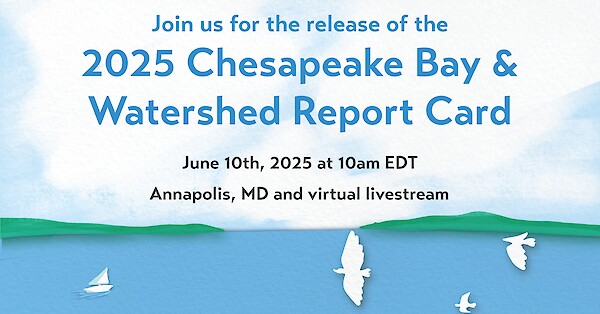
We're pleased to announce that the 2025 Chesapeake Bay & Watershed Report Card will be released on Tuesday, June 10th at 10am EDT! Please join us in person at the Annapolis Maritime Museum in Annapolis, MD or virtually through livestream to learn about the latest health status of the Bay and its Watershed! This year marks the 19th year we have released this report card and also the centennial celebration of UMCES, so we are excited to also unveil a special edition of the Chesapeake Bay Report Card along with our annual report card. We are also excited to release this report card during Chesapeake Bay Awareness Week 2025, which is being held from June 7–15 this year. If you would like to stay notified about the report card release, please click here to RSVP for the event.
20 years of the IAN E-newsletter
Believe it or not, the first IAN e-newsletter was published in June 2005! From our very first issue, we’ve grown, adapted, and thrived through two decades of change and innovation. This journey wouldn’t have been possible without the incredible support of our partners over the years—your collaboration has helped us make meaningful impacts both locally and around the world.
To our readers and supporters: thank you for staying with us, engaging with us, and believing in the value of what we share. Your continued interest fuels our passion and purpose. We look forward to keeping you informed and inspired for many more years to come.
Engaging community members at Nature Everywhere Week
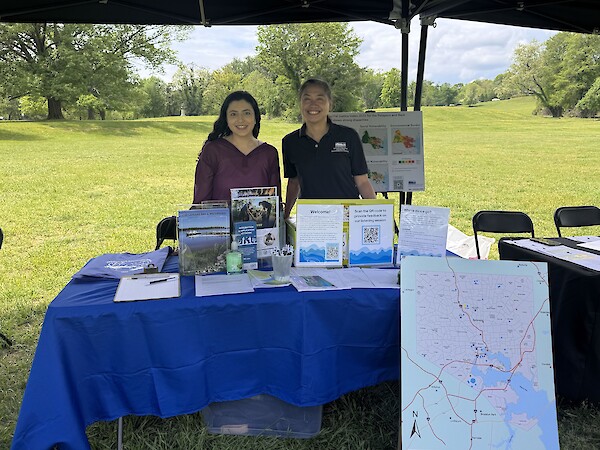
On May 1st, IAN hosted an interactive exhibit at the Nature Everywhere Week event at Druid Hill Park in Baltimore, MD. This was a week-long event aimed at fostering community participation with hands-on stewardship and promoting environmental literacy. Similar to previous listening sessions, our table featured activities meant to engage the community and understand their perspectives about the Chesapeake Bay and watershed. We also had kid-friendly activities that educated kids about the Chesapeake Bay and allowed them to express their creativity. Our continued engagement efforts are part of a broader initiative to improve our annual Chesapeake Bay and Watershed Report Card.
2025 Chesapeake Bay & Watershed Report Card
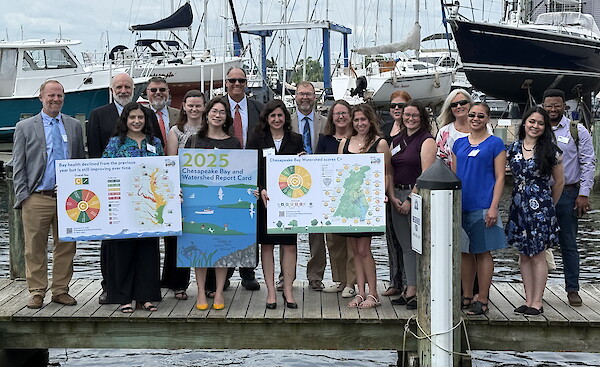
On Tuesday, June 10th, IAN released the 2025 Chesapeake Bay & Watershed Report Card at the Annapolis Maritime Museum. The release event program opened with a few words from UMCES President, Dr. Fernando Miralles-Wilhelm and featured comments from Secretary Josh Kurtz, Secretary Serena McIlwain, Senator Sara Love and virtually from Senator Chris Van Hollen and Representative Sarah Elfreth. The report card reveal was jointly presented by Drs. Bill Dennison and Heath Kelsey. To learn more about how the Bay and watershed scored this year, visit chesapeakebayreportcard.org. This year, we also released a special edition 1925 Chesapeake Bay Report Card to celebrate the UMCES Centennial and have both the 2025 and 1925 report cards available in Spanish for the first time!
Working towards a sustainable future at SRI 2025
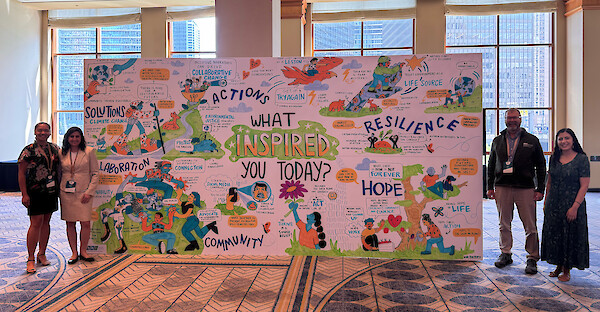
The fifth annual Sustainability Research & Innovation Congress (SRI) was held in Chicago, Illinois and virtually from June 16–19th. The theme this year was “Shaping a Sustainable Future” and included over 1200 attendees representing over 80 countries. The conference also encompassed some of the following sub-themes throughout the week: hope, actions, solutions, community, collaboration, and resilience. Several IAN staff were in attendance to host workshops about science communication and storytelling, co-producing socio-environmental report cards, and strategies for effective stakeholder engagement. The conference highlighted key global sustainability challenges and the multitude of approaches to solving them, notably through inclusive practices that go beyond the typical scientific research framework.
We moved!
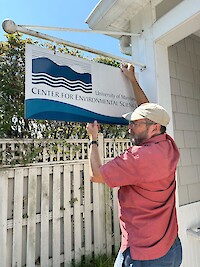
In July, we officially moved from our office in Eastport to our new office on 115 West Street. We are also sharing this new space with colleagues from UMCES University Administration. We are excited for this new chapter and for the opportunities ahead. We greatly appreciate everyone’s efforts to make this move possible and the new space functional.
Catfish cookout along the Rappahannock
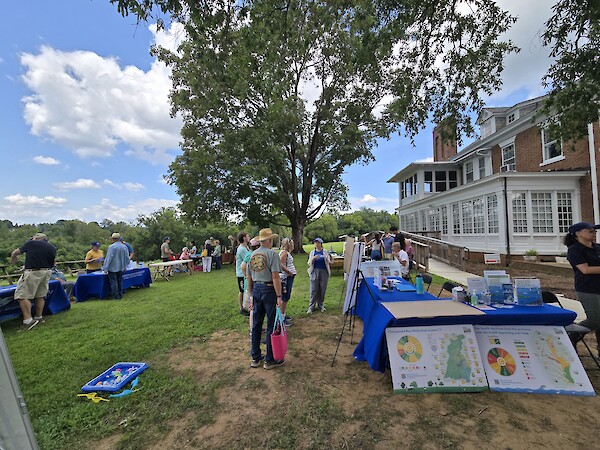
On August 2nd, the Rappahannock River Invasion: Catfish Cookout & Watershed Festival took place at the Patawomeck Museum & Cultural Center in Fredericksburg, VA. The Patawomeck Tribe of Virginia, IAN, and the Environmental Justice Journalism Initiative (EJJI) hosted the event. It also featured five regional partners who provided information and resources about their environmental intiatives. IAN's table offered its listening session approach that allowed for attendees to share their perspectives on considerations for improving the health status of the Chesapeake Bay and watershed. The highlight of the event was delicious blue catfish, and coupled with local music and beautiful weather, it made for a successful event. Situated adjacent to the Rappahannock River, the cookout brought awareness about invasive blue catfish and how their consumption can be an effective management initiative.
New videos added to our media library!
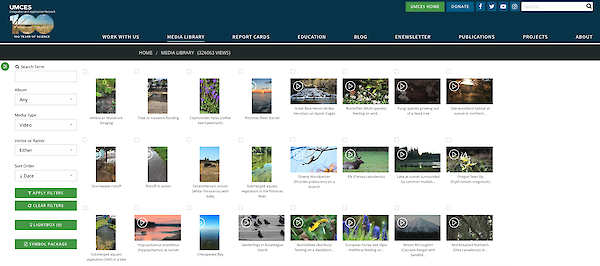
Last month, we added a total of 11 videos to our media library, covering topics such as flooding, wildlife, and Chesapeake Bay landscapes. All of these new videos, with the exception of one, are available in a vertical format for the first time, and having this option will better support social media needs for short-form video content. Our video library features over 100 high-quality videos that are free to download by anybody, and we look forward to continually expanding our offering.
New publication: Closing the parachute and opening the umbrella
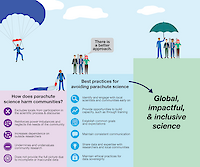
New paper alert! "Closing the parachute and opening the umbrella: Strategies for inclusivity and representation in producing impactful coastal ecosystem research." This paper was written in collaboration with several international friends and colleagues. Thanks for all your hard work!
Parachute science is the problematic and extractive practice of non-local researchers taking data, knowledge and information from communities of which they are not members. This practice fails to engage the local community and local scientists, marginalizing them in most aspects of the research to the benefit of the non-local researchers. Parachute science is perpetuated by colonialism and unequal access to resources like funding, education and data. It is harmful to local scientists and undervalues the contributions of the community as a whole.
Here, we offer our perspectives on parachute science and suggestions on how to avoid it, based on our collective experiences conducting research internationally with diverse scientists and communities. Instead of a parachute, we suggest opening the scientific "umbrella" to incorporate diverse perspectives and local contributions to generate relevant and impactful science.
Upcoming fall conferences
Come find us at some upcoming conferences! From November 7–9, we’ll be at the 20th Annual Chesapeake Watershed Forum in Shepherdstown, West Virginia, and from November 9–13, we’ll be at CERF in Richmond, Virginia. Several IAN staff will be giving talks and facilitating workshops at these conferences, which is a great opportunity to learn more about our work and expand your science communication skills. We hope to see you there!
Advancing collaborative, actionable science at CERF
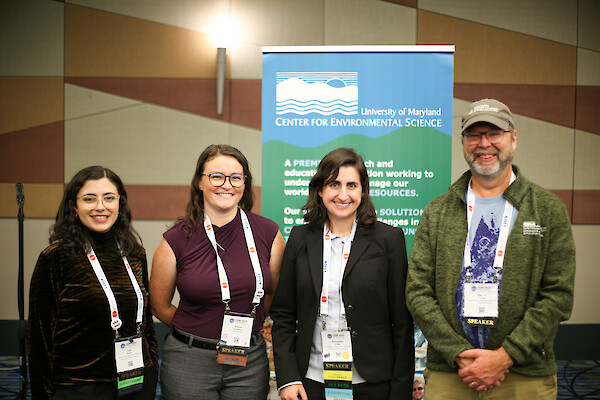
From November 9–13th, six IAN staff members attended the 28th Biennial CERF Conference in Richmond, VA. Throughout the week, we hosted a workshop on effective science communication, delivered oral presentations on our work, and joined a collaborative session on community-scale research. The conference highlighted numerous presentations on co-production approaches in coastal and estuarine research, and both plenaries emphasized solution-oriented science. Our work aligns closely with these approaches, and we value the opportunity to learn from and engage with colleagues across the field. This year brought an extra highlight: UMCES was honored with the CERF Achievement Award for Organizational Coastal Stewardship. To read more about our CERF 2025 experience, check out this blog post.
Meet the Scientist: Lili Badri

Hi! My name is Lili Badri, and I’m a senior science communicator at IAN. I grew up near the Alabama Gulf Coast and have fond memories of beach vacations that nurtured my love for the coastal environment. I later pursued studies in Chemistry and Environmental Science, spending my undergraduate years split between the lab, researching method development for water-quality trace analysis, and active involvement in my university’s sustainability and chemistry clubs. Through those groups, I participated in campus cleanups, tended the campus garden, partnered with local organizations to promote environmental stewardship, and organized chemistry outreach events for K–12 students.
In graduate school, I studied organic carbon dynamics in forested wetlands, gaining both hands-on field experience and exposure to the complexities of long-term environmental datasets. These research experiences naturally converged over time and sparked my interest in a more applied path, making my transition to IAN a clear next step into impactful, inclusive science. I’m driven by the belief that my work truly makes a difference, using data to support informed decision-making while prioritizing accessibility, transparency, and trust. I’m grateful to play a role in bringing scientists and non-academics together to tackle today’s environmental challenges locally and abroad and in helping to ensure that they have the tools they need to communicate their work with clarity and impact.
If you value research like Lili’s, consider donating to IAN here.
2025: A year in review
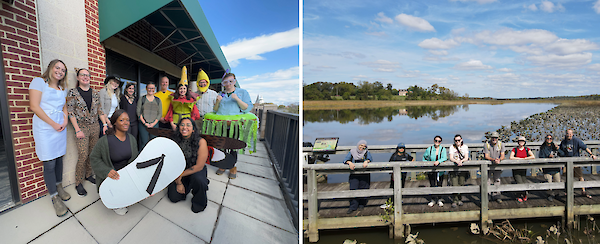
2025 was a special year for IAN, marked by significant milestones, global reach, and a new home. We participated in a total of 33 events spanning from local to international locations. We had a productive year with the release of over a dozen report cards assessing the socio-environmental health of the Chesapeake Bay and Coastal Bays regions, alongside 25 additional publications that emphasized the breadth and depth of our projects and partnerships.
Beyond our research, we proudly celebrated the UMCES Centennial and gave back to our local community by removing over 100 pieces of debris from Carr’s Beach. Finally, after eight years in Eastport, we transitioned to our new office at 115 West Street. We were delighted to welcome colleagues and friends to our year-end open house at the new space. We are grateful to all who made this year a success and look forward to the opportunities that 2026 will bring.
Notable publications in 2025
- The annual Chesapeake Bay and Watershed Report Card and a special 1925 edition (both available in English and Spanish)
- The first-ever Antietam Creek Watershed Report Card
- The first-ever county- and community-level climate adaptation report cards
- The third Patapsco River Report Card
- The annual Severn River Report Card
- The first-ever Loudoun Streams Report Card (available in English and Spanish)
- The annual Maryland Coastal Bays Report Card
- The annual IAN Report Card
- The report to the Maryland General Assembly in response to the Senate Bill 830 on Evaluating Methods to Enhance Oyster Production with Alternative Substrates, Retrofits, and Hatchery Holding Times
Peer-Reviewed Publications
We published 22 papers in 2025. Here are a few highlights:
- A novel threshold-based indicator for assessing dissolved oxygen criteria attainment deficits, buffers, and trends in Estuarine waters (Environmental Research: Water, Qian Zhang, Richard Tian, Zhaoying Wei, Rebecca Murphy)
- Closing the parachute and opening the umbrella: Strategies for inclusivity and representation in producing impactful coastal ecosystem research (Cambridge Prisms: Coastal Futures, Katie May Laumann, Lili Badri, Annie Carew, Jonathan Lefcheck)
- Geography, trajectories, and controls of coastal water quality: More rapid improvement in the shallow zone of the Chesapeake Bay (Environmental Science & Technology, Qian Zhang, Rebecca Murphy, Richard Tian)
- Coastal wetland resilience through local, regional and global conservation (Nature Reviews Biodiversity, Jonathan Lefcheck)
Teaching Science Communication in 2025
- June: IMET Summer Interns
- August: UMCES Graduate Students and Monsoon School
- November: 20th Annual Chesapeake Watershed Forum and 28th Biennial CERF Conference
Projects completed supporting EPA Chesapeake Bay Program
Web Team highlights:
- Improved user experience and content for ChesapeakeBay.net FAQ, Chesapeake Bay Watershed, and Chesapeake Bay Watershed Agreement pages
- Completed user research to inform future enhancements to ChesapeakeBehaviorChange.org
- Updated the program's reports of progress toward 17 outcomes
Data Analysis Team highlights:
- Continued work on tributary summaries, including completion of Potomac Tributary Summary
- Release of 2024 Chesapeake Bay Tidal Water Quality Trends
- STAC Workshop Review: Leveraging Artificial Intelligence and Machine learning to Advance Chesapeake Bay Research and Management: A Review of Status, Challenges, and Opportunities
Chesapeake Center for Collaborative Computing (C4) Team highlights:
- Completed a twelfth year of cloud infrastructure support, extended the second six-year C4 cooperative agreement into a seventh year, and chosen to continue that support under a third C4 cooperative agreement. CBPO Data Center developments in supported C4 cloud infrastructure over the last year included Web Team improvements to sites, increased use of generative AI, and further refinement of high-performance computing clusters. C4 provides the Chesapeake Bay Program with cloud and IT resources to meet scientific and business computing needs.
STAR Meeting: All About Indicators

On January 29th, the Scientific, Technical Assessment and Reporting (STAR) Team held their monthly meeting. The topic this month focused on the future of Chesapeake Bay Program indicators in the context of the revised Watershed Agreement and efforts to improve communication of progress towards Agreement goals. The meeting also featured speakers from UMCES IAN and Puget Sound Partnership to provide examples of how other organizations use and develop indicators. Alexandra Fries spoke about the evolution and expansion of the Chesapeake Bay and Watershed Report Card, the framework used for developing indicators, and the importance of tying together indicators into a compelling narrative. The meeting concluded with an open discussion about the different types of indicators and various approaches for the development of new indicators.
New Publication Highlight
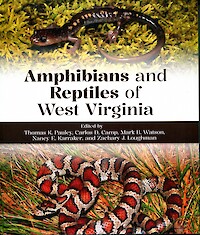
Conor Keitzer, IAN Science Integrator, was a contributing author to the recently published "Amphibians and Reptiles of West Virginia" edited by T.K. Pauley et al. 2025. It is a comprehensive, expert-led guidebook that utilizes decades of specialized research and field experience to provide detailed identification, distribution, and ecological data for every native species in the state.